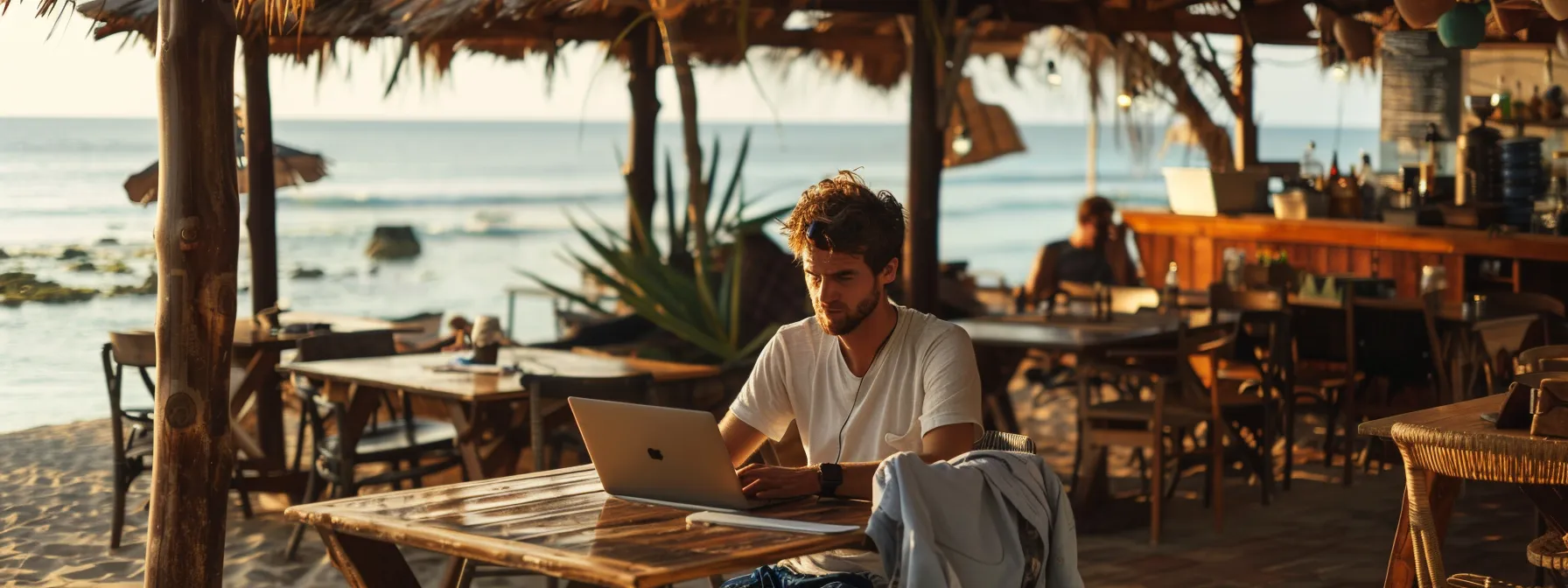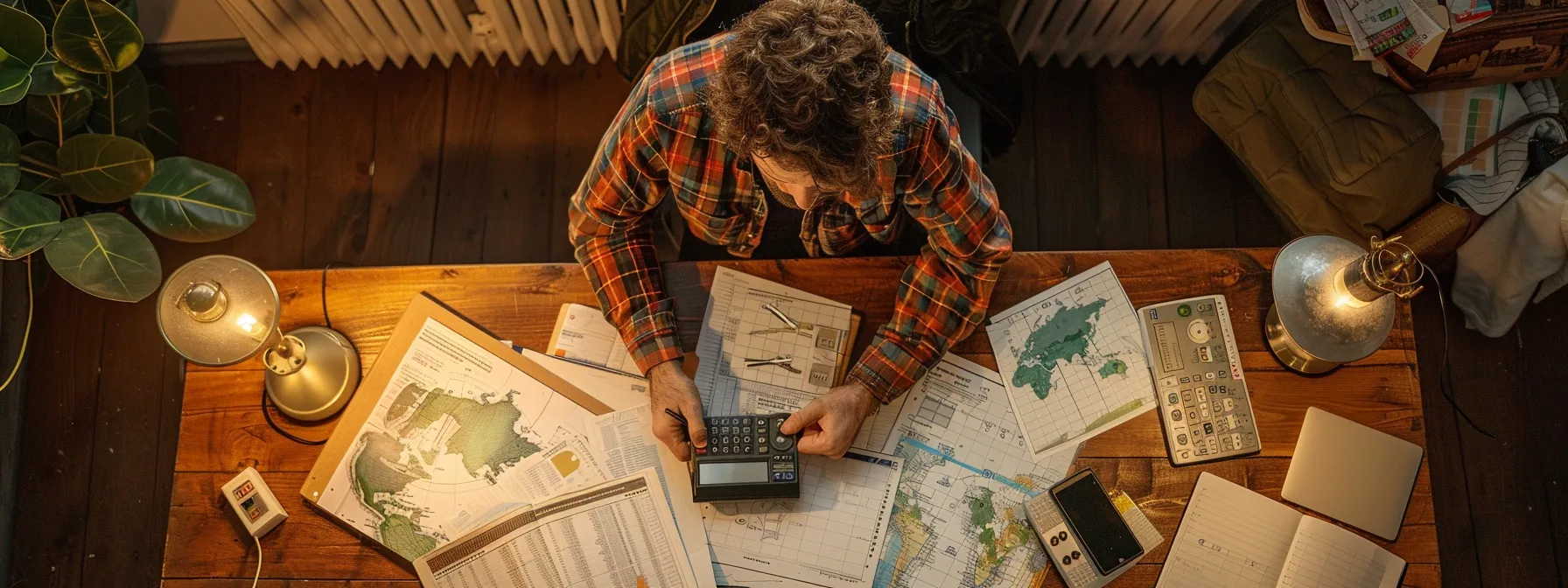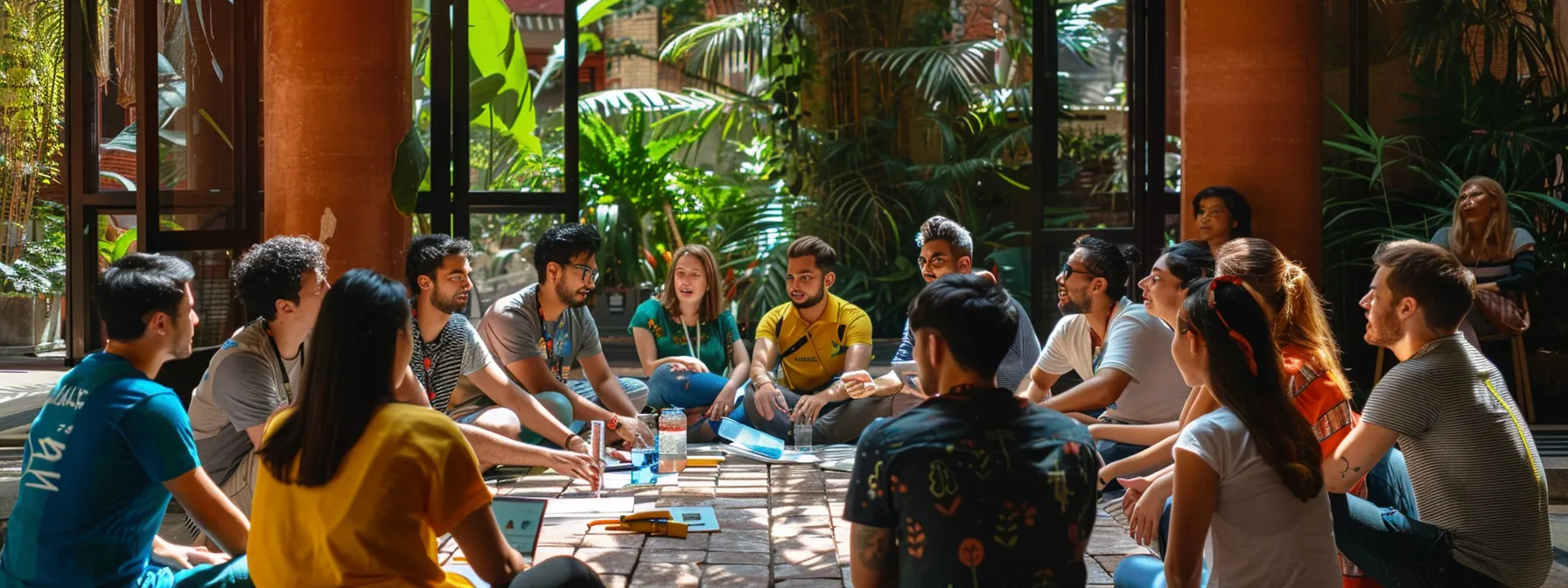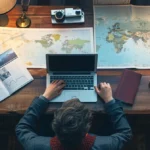Table Of Contents:
- Understanding Country-Specific Nomad Visa Eligibility Criteria
- Key Takeaways
- Eligibility Requirements for Digital Nomad Visas by Country
- Income Thresholds for Applicants
- Required Documentation for Proving Remote Employment
- Health Insurance and Background Check Requirements
- Minimum Stay and Tax Implications
- Renewal Conditions and Dependents Inclusion Criteria
- Specific Countries With Unique Additional Conditions
- Step-by-Step Guide to Applying for a Digital Nomad Visa
- Identifying the Right Visa Based on Your Destination Country
- Gathering the Necessary Paperwork and Documentation
- Understanding the Application Timeline and Fees
- Submitting Your Application: Online Processes vs. Embassy Visits
- Tracking and Finalizing Your Visa Status
- Top Countries With Favorable Nomad Visa Policies
- Overview of Countries Offering Digital Nomad Visas
- Comparative Analysis of Visa Benefits and Limitations
- Insights Into Living Conditions and Community for Digital Nomads
- Resources for Further Information on Each Country’s Policy
- Legal Considerations for Digital Nomads on Country-Specific Visas
- Navigating Local Labor Laws as a Foreign Employee
- Understanding Tax Obligations in the Host Country
- Insurance and Healthcare Requirements for Nomads
- Addressing Potential Legal Issues While Abroad
- Financial Implications of Country-Specific Nomad Visas
- Calculating the Cost of Application and Renewal Fees
- Budgeting for Living Expenses in Various Countries
- Understanding Foreign Exchange Rates and Banking Options
- Tax Planning for Digital Nomads: Home Country vs. Host Country
- Cultural and Social Considerations for Nomads
- Adapting to Cultural Differences in the Host Country
- Building a Social Network as a Digital Nomad
- Language Barriers and Communication Tips
- Downside of Nomadic Life: Dealing With Isolation and Burnout
- Conclusion
Understanding Country-Specific Nomad Visa Eligibility Criteria
As an expat travel coach, I understand that navigating the visa process can feel overwhelming, especially with the diverse eligibility criteria outlined in the Nomad Passport Index. Whether you have a birth certificate that needs translating or are considering an electronic visa, knowing the specifics can help you streamline your journey. The concept of flag theory often plays a crucial role in selecting the best destination for your lifestyle. Exciting opportunities await as we explore various country-specific nomad visa policies. You’ll uncover the steps to apply and crucial legal considerations that can dramatically impact your experience as a digital nomad. Keep reading to find out which countries offer the most favorable conditions for your nomadic adventure!
Key Takeaways
- Understanding visa eligibility requirements is crucial for digital nomads seeking to live abroad
- Health insurance and background checks are often mandatory for digital nomad visa applications
- Knowing local tax obligations helps in financial planning and compliance as an expatriate
- Building a strong social network eases adaptation challenges experienced by digital nomads
- Proactively addressing feelings of isolation and burnout enhances overall well-being in nomadic life
Eligibility Requirements for Digital Nomad Visas by Country

As I dive into the eligibility requirements for digital nomad visas, you’ll find that these criteria vary significantly from country to country. Each nation sets its own standards for income thresholds, often requiring proof of sufficient earnings to ensure you can support yourself abroad. You’ll also need to demonstrate your remote employment status with proper documentation, often needing a letter from your employer explaining your role. Health insurance is typically a non-negotiable aspect, along with background checks, ensuring you meet the safety and health regulations set by the host country. Understanding the implications of your tax residence status is crucial since some countries might flag theory your earnings differently based on local laws. Additionally, it’s important to know the minimum stay requirements and how to navigating the visa process renewal conditions if you plan on extending your visa. Lastly, I’ll cover specific countries, such as holy see, which may have unique conditions compared to others. Engaging a lawyer familiar with local terms of service Nomad Passport Index can be invaluable in making sense of the intricate conditions associated with your work permit and overall eligibility.
Income Thresholds for Applicants
When considering income thresholds for digital nomad visa applicants, the requirements can be astonishingly diverse. For instance, while some countries may set a relatively low bar, others, like South Sudan, maintain stringent policies that demand a higher income. It’s essential to research the specific immigration law of your desired destination to understand how much income you’ll need to prove, as these figures influence your eligibility.
Beyond just salary, many nations recognize various forms of financial stability, including passive income sources. This means that if you have income coming from investments or rental properties, you might still meet the necessary financial criteria. Being aware of how countries incorporate passive income into their immigration policies can broaden your options in this evolving landscape.
Moreover, the financial demands aren’t purely based on individual income; they may also reflect local cost of living standards. Understanding how your earnings align with these standards can help you prepare accurately. By familiarizing yourself with income thresholds tailored to the region, you can strategically plan your move and avoid unnecessary complications during the visa application process.
Required Documentation for Proving Remote Employment
To establish proof of remote employment for a digital nomad visa, having an employment contract is often required. This document outlines your job position, responsibilities, and the nature of your work. As a skilled worker, it’s essential that this contract clearly specifies your ability to work from locations outside your employer’s traditional office environment.
In addition to your employment contract, providing supporting documentation that reflects your lifestyle as a remote worker can significantly strengthen your application. This evidence may include communications from your employer about your work arrangements or invoices if you’re freelancing. Such materials help immigration officials verify that your primary source of income derives from remote work.
Finally, it’s wise to familiarize yourself with the specific immigration requirements of your target country as they relate to remote employment documentation. I often find clients with a well-prepared FAQ section tailored to their visa applications have an easier time navigating the process. This preparation not only clarifies your position but can help preemptively address any potential concerns from immigration officials.
Health Insurance and Background Check Requirements
Health insurance is a non-negotiable requirement for securing a digital nomad visa in many countries, including Grenada. As I guide clients through various applications, I emphasize the necessity of obtaining coverage that meets the specific criteria outlined by immigration authorities. Many times, these policies need to provide adequate protection for medical emergencies, ensuring that applicants have access to local healthcare infrastructure during their stay.
Additionally, background checks play a crucial role in the visa approval process. Countries often require thorough verification to assess the character and past conduct of applicants. This process can uncover any red flags which may affect one’s ability to work in coworking spaces or other collaborative environments, especially if looking to engage in outsourcing opportunities while abroad.
In regions like Sudan, where safety and security are significant concerns, complying with background check requirements is particularly important. I often advise clients to gather all necessary documentation ahead of time to avoid potential delays. Meeting these health insurance and background check stipulations not only paves the way for a smoother application experience but also fosters peace of mind while living and working away from home.
Minimum Stay and Tax Implications
When I guide clients through the process of obtaining a digital nomad visa, understanding the minimum stay requirements is essential. Some countries may stipulate a relatively short minimum duration, while others, such as Hungary, might require more extended commitments. This aspect affects not only your plans but also your lifestyle and quality of life abroad.
Tax implications are another critical factor when considering a nomadic lifestyle. Different countries impose varying tax rates on foreign income, which can significantly impact your net earnings. For instance, if you hold a marriage certificate from your home country, it might affect your tax liabilities when you decide to settle temporarily in a new locale.
It’s vital to research how your chosen country’s regulations align with your financial situation. Knowing the tax obligations, including potential deductions or exemptions related to your salary as a digital nomad, helps in budgeting effectively. This knowledge empowers you to make informed decisions about where to live and work, ultimately enhancing your overall experience as an expatriate.
Renewal Conditions and Dependents Inclusion Criteria
As I help clients navigate the nuances of digital nomad visas, understanding the renewal conditions becomes vital. Countries often set specific timelines and fees associated with renewals, and knowing these details can prevent unexpected disruptions to your stay. For example, in the United Arab Emirates, timely renewal applications ensure continuous compliance with visa regulations, which is crucial for those exploring new opportunities abroad.
Moreover, health insurance is typically a requirement for both initial applications and renewals. I often advise clients to secure a policy that remains valid for the entire duration of their visa, including the renewal period. This proactive approach not only aligns with immigration requirements but also offers peace of mind, knowing you’re protected while living in a foreign country.
Finally, the inclusion of dependents under your travel visa can greatly affect your plans. Some countries allow family members to be included, while others have restrictions that could complicate your situation. Understanding how dependents fit into the eligibility criteria means you can better plan your expatriate experience and ensure your family can join you without unnecessary hurdles.
Specific Countries With Unique Additional Conditions
The Republic of the Congo presents unique conditions for digital nomads seeking a temporary residence permit. Applicants must submit a tax return from their home country, which can be a surprising requirement for those used to simpler processes elsewhere. This added layer ensures that the government can assess your financial stability and compliance with local fiscal regulations.
When applying for a nomad visa in certain regions, understanding the local culture is critical. For example, some countries may require applicants to demonstrate cultural integration, including language proficiency or community involvement. This not only enriches your personal experience but also fosters a deeper connection with the locals during your stay.
Further complicating matters, countries often dictate specific conditions tailored to their unique socio-economic climates. I’ve encountered situations where applicants face additional documentation requirements, such as proof of accommodation or local sponsorship. Staying informed about these nuances helps streamline your application process and makes settling in less stressful.
- Unique tax return requirements in the Republic of the Congo.
- Cultural integration expectations affecting nomad visa eligibility.
- Additional documentation necessary based on local conditions.
Now that you know the eligibility requirements for digital nomad visas in various countries, it’s time to take action. Get ready to navigate the application process with my detailed step-by-step guide, ensuring a smooth transition to your new life as a remote worker abroad!
Step-by-Step Guide to Applying for a Digital Nomad Visa

As I guide clients through the process of obtaining a digital nomad visa, it’s vital to approach each step with clarity and precision. First, identifying the right visa that aligns with your destination country is key, especially if you’re considering the Czech Republic or any country within the Schengen area. Each location has its own set of criteria that can directly influence your standard of living while abroad. Next, gathering the necessary paperwork, including proof of remote employment and potentially a marriage certificate if applicable, will set a solid foundation for your application. Understanding the application timeline and fees associated with your choice is crucial, as it helps to manage expectations. When it comes to submitting your application, knowing whether to navigate online processes or visit your local embassy can save time and streamline the experience. Finally, tracking and finalizing your visa status ensures you remain compliant while living in diverse locales, including any future ventures into the Middle East. Each of these steps composes a roadmap designed to simplify your journey toward becoming a digital nomad.
Identifying the Right Visa Based on Your Destination Country
Identifying the right visa for your situation starts with a thorough understanding of each country’s specific requirements. I always recommend beginning with research to ensure that you know the latest rules regarding digital nomad visas, as they can frequently change. Depending on your destination, some countries might require proof of income that meets or exceeds their minimum wage standards, while others may not have such stringent requirements.
As I guide clients through this complicated landscape, I emphasize the importance of considering the nature of your remote work. Different countries recognize remote work differently, and some may demand more extensive documentation than others. Knowing what your host nation expects around employment verification can make the application process much smoother and less stressful.
Keep in mind that, in addition to income and work verification, the tourism policies of your destination country might impact your application. Countries with stronger tourism sectors may have more streamlined processes for digital nomads. Ultimately, gathering accurate information on visa conditions puts you in a better position to make informed decisions:
Gathering the Necessary Paperwork and Documentation
Gathering the necessary paperwork is a pivotal stage in applying for a digital nomad visa. I advise clients to start with their employment verification documents, such as contracts or employer letters, which confirm their remote work status. Maintaining a well-organized bank account statement may also be beneficial, showcasing your financial stability and proving you can support yourself while living abroad.
In addition to employment verification, it’s essential to be aware of the specific banking regulations in your chosen destination. For instance, if you’re planning to apply for a visa in Saint Lucia or any other Caribbean nation, understanding local compliance can ease the process. Keep in mind that some countries may require evidence of local banking activity or proof of a foreign bank account to ensure seamless financial operations during your stay.
Applying from within the European Economic Area can also present specific demands when it comes to documentation. I often remind clients that they should be prepared for varying expectations based on their country of residence. Make sure to collect these important documents before you initiate the application process:
- Employment verification and related contracts
- Bank account statements demonstrating financial stability
- Specific documents that adhere to local regulations
Understanding the Application Timeline and Fees
Understanding the application timeline for a digital nomad visa varies significantly depending on the country you choose. For instance, in North Macedonia, the processing time can be relatively quick, often completed within a month, while in the Cayman Islands, it may take longer due to stricter regulations and workloads on immigration officials. Being aware of these timelines allows you to plan your move more effectively and avoid any potential delays.
When I assist clients, I always emphasize the necessity of budgeting for application fees, which can also differ from one nation to another. The fees to apply for a digital nomad visa can include costs related to submitting a bank statement or other financial documents, and they may vary from affordable to quite steep, particularly in luxury destinations like the Cayman Islands. Planning in advance ensures that there are no financial surprises during the application process.
Clients often ask about the implications of having a current green card when applying for a digital nomad visa. While each country has different requirements, having a green card may demonstrate your ability to adhere to immigration rules, particularly if you come from a country with specific visa restrictions for Arabs. Understanding how this factor integrates into your overall application can make a significant difference in how swiftly your visa is approved.
Submitting Your Application: Online Processes vs. Embassy Visits
When I assist clients in submitting their application for a digital nomad visa, I often highlight the distinct pathways available: online processes or in-person visits to the embassy. Choosing the right option can impact the price and efficiency of the application, particularly in countries like The Bahamas, which might have specific laws regarding visa submissions. Understanding these differences allows you to optimize your approach based on personal circumstances and preferences.
Online applications typically streamline the process, allowing applicants to fill out necessary forms, upload documents, and track their status easily. This method often appeals to those in the remote workforce, especially since it eliminates the need to visit an embassy and wait in lines. However, some clients find that certain documents might require additional verification, which can lead to delays if not prepared correctly from the start.
Conversely, visiting an embassy for application submission might provide more personal interaction with staff who can clarify any potential queries on the spot. This face-to-face approach can be beneficial if you need immediate assistance or specific guidance on local laws pertinent to your visa. Considering both methods allows you to select the best route and stay on top of your application process without unnecessary hiccups:
Tracking and Finalizing Your Visa Status
Once you’ve submitted your digital nomad visa application, tracking its status becomes essential. I often suggest checking the immigration website of the specific country, whether it’s Antigua or Dominica, to monitor any updates. Staying informed not only helps manage your expectations but also allows you to make travel arrangements, such as planning your next vacation, without unnecessary stress.
After receiving your visa approval, finalizing your status requires careful attention to detail. For instance, I advise confirming your entry date and understanding the regulations regarding public transport in your destination, as compliance can vary significantly. Having a clear understanding of the process helps ensure a smooth transition into your new life as a digital nomad.
In some cases, you might need to register your visa with local authorities upon arrival, especially in places like Macau. This step is crucial to avoid any legal complications down the line. By staying proactive and organized, you can fully embrace your new environment and focus on your work without the weight of visa uncertainties lingering overhead.
With the application process in hand, let’s shift our focus to the best destinations that embrace digital nomads. Discover which countries offer the most favorable visa policies for your next adventure!
Top Countries With Favorable Nomad Visa Policies

As I evaluate the landscape of digital nomad visas, I find a growing number of countries offering appealing options for remote workers. Countries like Cape Verde stand out, thanks to their moderate cost of living, rich cuisine, and reliable telecommunicationsinfrastructure. This creates an ideal environment for those seeking both adventure and comfort while working abroad. In my analyses, I often compare the benefits and limitations of various visa programs, considering factors such as income requirements and duration of stay. Ultimately, understanding the living conditions and local communities will help travelers select the right destination that aligns with their lifestyle. I’ll also provide resources for further information, ensuring you’re well-equipped to make informed choices about your nomadic journey.
Overview of Countries Offering Digital Nomad Visas
As I examine the landscape of digital nomad visas, it’s clear that countries around the globe, especially in North America and the European Union, are recognizing the potential of remote workers. Many have shifted their policies post-pandemic to attract professionals who wish to maintain a lifestyle that supports both work and travel. This evolving trend highlights the need for countries to adapt to the changing dynamics of work in a globalized world.
In the Caribbean, Antiguaand Barbuda has emerged as an attractive option for digital nomads. With its idyllic beaches and laid-back lifestyle, this destination offers a straightforward visa process that allows remote workers to embrace an enriching cultural experience while staying productive. I often find clients intrigued by the idea of combining work with the vibrant lifestyle that this beautiful nation has to offer.
Moreover, South America is beginning to carve its niche in the digital nomad space by introducing flexible visa options. Countries like Brazil and Colombia are promoting their rich cultural landscapes and affordable living, drawing in remote workers looking to explore vibrant cities and lush landscapes. The potential for a fulfilling work-life balance in these nations creates an exciting landscape for digital nomads seeking adventure while staying productive.
Comparative Analysis of Visa Benefits and Limitations
As I examine various countries that offer nomad visas, I appreciate the flexibility that nations like Namibia and Bermuda provide. Namibia’s remote work regulations favor those with a stable income through a contract, making it easier for professionals to plan their stay. In contrast, Bermuda offers a streamlined process that ensures quick access to health care while maintaining high standards, which can be appealing for digital nomads.
While Bermuda shines with its efficient health care system, Namibia presents a different landscape with a low cost of living, creating a unique blend of affordability and adventure for remote workers. Travelers must weigh the benefits of immediate health care access against the economic advantages of living in Namibia. These factors often play a critical role in determining the best fit for an individual’s lifestyle and priorities.
Ultimately, every country’s nomad visa comes with its own set of benefits and limitations that impact daily life and work. Understanding how transport options and logistical challenges vary across destinations can influence my clients’ choices. I recommend considering both immediate needs, like health care access, and the broader implications of living in a particular country, which can contribute to a fulfilling expat experience:
Insights Into Living Conditions and Community for Digital Nomads
As I evaluate various destinations for digital nomads, Latvia stands out for its unique blend of vibrant culture and affordability. The inclusive community atmosphere allows individuals from diverse nationalities to thrive, fostering an environment that is supportive to newcomers. Living in places like Riga not only provides modern amenities but also a rich historical backdrop that enriches the expat experience.
Curaçao offers a distinct charm with its stunning beaches and warm climate, making it an attractive option for digital nomads seeking both productivity and leisure. The locals’ welcoming nature adds to the sense of community, allowing expats to easily connect and build relationships. This combination of a low-cost lifestyle and an inviting environment creates a potent incentive for those looking to establish their remote working lives.
Similarly, Anguilla‘s pristine landscapes and tranquil atmosphere create an ideal setting for focused work and relaxation. The island’s small size contributes to a close-knit community where interactions tend to be more personal, allowing expatriates to find their place more easily. This welcoming culture acts as a significant incentive, drawing remote workers seeking both professional fulfillment and a sense of belonging during their travels.
Resources for Further Information on Each Country’s Policy
To navigate the complexities of nomad visa eligibility, I encourage clients to visit official government websites for the most reliable updates on requirements. These sites typically outline essential documentation, such as background check stipulations and the necessary proof of employment. Understanding these guidelines can help streamline the application process significantly.
Additionally, I often recommend checking local expat forums and communities, as they frequently share personal experiences and tips that can give insight into hidden expenses and unique conditions that aren’t covered in official resources. For example, information on health insurance or citizenship documentation can be invaluable. These peer-shared resources provide a fuller picture and can alert you to potential hurdles along your journey.
Lastly, don’t overlook the value of consulting professionals who specialize in immigration law within your target destination. Their expertise can clarify nuances, such as residency permits and specific employment criteria tied to the nomad visa. Gaining knowledge from multiple sources can empower you to make informed decisions, ultimately enhancing your expatriate experience.
Having explored the top countries that welcome digital nomads with open arms, it’s time to shift our focus. Understanding the legal landscape of country-specific visas is crucial for a smooth and successful journey as a digital nomad.
Legal Considerations for Digital Nomads on Country-Specific Visas

When navigating the complexities of country-specific nomad visas, understanding legal considerations is paramount. I often encounter clients who need guidance on how to interpret local labor laws as foreign employees, ensuring compliance while working abroad. It’s vital to have a clear checklist that covers their tax obligations, especially in instances of potential double taxation, where two countries may impose tax on the same income. Documentation requirements vary, and I’m always prepared to help clients compile the necessary documents that adhere to the rules set by organizations like the OECD. Additionally, knowing the insurance and healthcare prerequisites in the host country, such as in Slovakia, is crucial to safeguarding your well-being. Addressing any potential legal issues proactively allows for a smoother expatriate experience, giving you peace of mind during your adventure.
Navigating Local Labor Laws as a Foreign Employee
Navigating local labor laws as a foreign employee can be challenging, especially in countries where the climate and socio-economic conditions differ significantly from what I’m accustomed to. Understanding how poverty levels impact employment regulations is essential; those conditions can shape labor rights and benefits offered to expatriates. Therefore, I prioritize familiarizing myself with these laws to promote both my compliance and productivity while living abroad.
Being proficient in the English language also plays a vital role in understanding local labor laws, as many legal documents and resources may only be available in the local dialect. This knowledge not only assists in deciphering employment agreements but also allows for effective communication with local authorities and potential employers. I’ve found that transparency in interactions can help me avoid any potential misunderstandings regarding my travel document status and specific legal obligations.
Each country I explore has unique labor laws that can vary significantly in terms of worker rights and benefits. By actively seeking guidance from local legal experts or expat communities, I ensure that I stay informed about regulations that might affect my work life. This proactive approach grants me peace of mind, as I navigate the complexities of being a foreign employee while enjoying the adventure of working in diverse environments.
Understanding Tax Obligations in the Host Country
Understanding tax obligations in Montserrat or any host country is vital for managing your finances as a digital nomad. Each jurisdiction has unique tax laws that could impact your earnings, and failing to comply can expose you to risks that affect both your legal standing and financial well-being. It’s crucial to stay informed about local tax requirements and seek advice to navigate this complex landscape effectively.
Moreover, as I coach clients through the intricacies of living abroad, I emphasize the importance of considering how taxation in the host country can influence welfare benefits. Many countries have agreements that can mitigate double taxation, allowing you to retain more of your income. Understanding these agreements is essential, as they can significantly affect your net income while living as a digital nomad.
By keeping a close eye on any changes in tax regulations, especially in locations like Montserrat, I can help clients adapt their financial strategies accordingly. This proactive approach not only safeguards against unforeseen financial liabilities but also empowers individuals to make informed choices about their work and lifestyle abroad. Ultimately, being tax-savvy contributes to a successful expatriate experience, allowing for a fulfilling adventure while minimizing complications.
Insurance and Healthcare Requirements for Nomads
When considering insurance and healthcare requirements, I’ve found that many countries mandate proof of adequate coverage for foreign nationals applying for a nomad visa. This requirement aims to ensure that applicants can access local medical services and are protected against unexpected healthcare costs. For instance, in places like Saint Kitts and Nevis, having an approved insurance policy is essential for a successful visa application.
Moreover, some nations may require documentation related to your criminal record as part of the visa eligibility process. Providing a clean criminal record not only aligns with health insurance requirements but also demonstrates your commitment to being a responsible foreign national. This aspect can impact your overall application, as countries want to ensure the safety and security of both residents and visitors.
It’s prudent to research the specific health coverage options accepted in your target country. Different locations may have unique stipulations regarding the types of insurance plans that meet their criteria. This research might encompass local healthcare services, regional regulations, and insurance provider partnerships, allowing a thorough understanding of the requirements you need to fulfill:
- Verification of adequate health insurance coverage.
- Criminal record checks for eligibility.
- Knowledge of local healthcare services and insurance requirements.
Addressing Potential Legal Issues While Abroad
When I travel abroad as a digital nomad, I know that navigating local laws is vital for a smooth experience. Many countries have distinct legal landscapes that can catch newcomers off guard, and it’s essential to remain informed about my rights and responsibilities. By understanding local regulations, I can reduce the risk of running into unexpected legal problems that can alter my plans.
To effectively address potential legal issues while abroad, I prioritize building a network of local contacts who can offer advice and support. Connecting with fellow expats or local legal professionals can provide me with valuable insights regarding labor laws, tax obligations, and compliance expectations. This network often serves as a resource to clarify any confusing regulations, especially if language barriers arise.
Taking the initiative to document important legal requirements helps me stay organized and compliant during my stay. Whether it’s maintaining copies of my visa documents or keeping track of immigration deadlines, I find that thorough record-keeping can significantly help me avoid complications. Each of these steps contributes to my overall well-being and allows me to focus on my work and lifestyle abroad:
Understanding the legal landscape is only the beginning. Let’s dive into the financial impact of securing a country-specific nomad visa and how it influences your travel budget.
Financial Implications of Country-Specific Nomad Visas

Understanding the financial implications of country-specific nomad visas is essential for a successful transition into expat life. I’ve seen firsthand how calculating application and renewal fees can dramatically impact one’s budget, especially when evaluating options across different countries. Budgeting for living expenses, tailored to local costs, is a critical aspect I advise my clients to prioritize. Additionally, grasping foreign exchange rates and banking options will help you manage your finances efficiently while abroad. With tax planning, comparing obligations in your home country versus your host country is vital to ensure compliance and optimize your financial situation. Each of these elements plays a pivotal role in shaping a sustainable and enjoyable nomadic lifestyle.
Calculating the Cost of Application and Renewal Fees
Calculating the cost of application and renewal fees is an integral step in planning for a digital nomad visa. I always recommend that my clients thoroughly research the fee structures of their target countries because these costs can vary widely. Understanding these financial commitments upfront allows for better budgeting and reduces surprises during the application process.
In addition to the initial application fees, I emphasize the importance of taking renewal fees into account. Some countries may require periodic renewals that come with their own costs, which can strain a budget if not planned for. I encourage my clients to keep track of these fees to ensure they maintain compliance without financial strain.
When summarizing the financial commitments for a digital nomad visa, I typically break them down into specific categories. This clarity helps my clients visualize their expenses and prepare accordingly:
- Initial application fees
- Renewal fees
- Potential fees for required documentation
Budgeting for Living Expenses in Various Countries
When I consider budgeting for living expenses in various countries, one of the first factors I evaluate is the local cost of housing. I have found that expenses can fluctuate greatly depending on the city and type of accommodation, whether it’s a shared apartment or an independent rental. Analyzing the rental market ahead of time enables me to refine my budget and avoid unforeseen financial strain.
Additionally, I pay close attention to daily living costs, such as groceries, transportation, and utilities, as these can significantly influence my overall financial planning. I often consult local cost-of-living indices to gain insights into how my spending may differ from country to country. By taking these variables into account, I can create a more accurate picture of what my financial commitments will look like in my host country.
Finally, I consider the potential for unexpected expenses, which can arise when adjusting to a new environment. Whether it’s medical costs or service fees, having a buffer in my budget is essential to navigating the uncertainties of life as a digital nomad. This approach not only fosters peace of mind but also enables me to seize opportunities without the worry of exceeding my financial limits.
Understanding Foreign Exchange Rates and Banking Options
Understanding currency exchange rates plays a vital role in my financial planning as a digital nomad. Fluctuating rates can significantly impact the amount of local currency I receive for my income, influencing my budget and spending power abroad. Tracking these rates helps me make informed decisions about when and how to convert my funds to minimize costs.
In addition to exchange rates, I explore various banking options available in my host country. Many financial institutions offer accounts tailored for expatriates, providing features that facilitate easier access to funds and lower transaction fees. Knowing which banks cater to nomads allows me to secure my finances effectively while abroad.
When selecting a banking option, I always prioritize those offering online accessibility and mobile banking capabilities. This accessibility ensures I can manage my finances efficiently, regardless of where I am located. Understanding the prerequisites for opening an account and any necessary documentation is essential for a smooth setup process:
Tax Planning for Digital Nomads: Home Country vs. Host Country
As I navigate the complexities of tax planning, I’ve recognized how pivotal it is to understand the tax obligations in both my home country and the host country. Each nation adopts a unique approach to taxing income, which affects my net earnings significantly. Keeping up with these varying regulations is essential for ensuring compliance and optimizing my financial situation while living abroad.
I’ve found that bilateral tax treaties often play a crucial role in mitigating the risk of double taxation. These agreements can allow me to reduce the amount I pay in either country or sometimes eliminate taxes on certain income sources altogether. By being proactive and researching these treaties, I can effectively strategize my financial approach and potentially save a considerable amount this way.
Furthermore, it’s necessary to remain vigilant about filing requirements in both jurisdictions, as missing deadlines can lead to penalties or complications. I make it a priority to plan ahead and seek guidance from tax professionals who understand the nuances of international taxation. This proactive approach helps me to manage my finances wisely and maintain a clear understanding of my obligations throughout my digital nomad journey.
Navigating financial aspects is just the beginning of your journey. Next, let’s uncover the vibrant cultures and social dynamics that await you as a nomad.
Cultural and Social Considerations for Nomads

As I navigate life as a digital nomad, embracing the cultural landscape of my host country becomes essential. Adapting to local customs and social norms not only enhances my experience but also fosters mutual respect and understanding with the people around me. Building a social network is another crucial aspect; establishing connections with fellow expats and locals can provide support and companionship during my journey. I also face language barriers that occasionally hinder communication, so I’ve developed strategies to overcome this challenge and engage meaningfully. However, nomadic life isn’t without its downsides. I often encounter feelings of isolation and burnout, reminding me that maintaining mental well-being amidst constant change is just as important as managing the logistical elements of this lifestyle. Addressing these factors holistically allows me to thrive in my expatriate experiences.
Adapting to Cultural Differences in the Host Country
Adapting to cultural differences in my host country requires an open mind and a willingness to learn. I focus on immersing myself in local customs and traditions, which helps me build genuine connections with the people around me. Engaging with local communities not only deepens my understanding of their way of life but also enriches my overall experience.
I make it a priority to familiarize myself with social norms and expectations, as these can vary significantly from my home country. This involves observing local practices and respecting etiquette, whether it’s a simple greeting or dining together. Taking the time to learn these nuances demonstrates my respect for the culture and fosters harmonious interactions.
Language can be a barrier, but I work on overcoming it by studying common phrases and expressions. Even attempting to speak the local language can break down walls and initiate conversation, giving me an opportunity to connect on a deeper level. These efforts lead to more meaningful relationships and a richer experience as I navigate my new environment:
- Engaging with local communities to learn customs.
- Observing social norms and respecting etiquette.
- Studying the local language to enhance interactions.
Building a Social Network as a Digital Nomad
Building a social network as a digital nomad is critical for enhancing my experience abroad. I actively seek out local communities, expat groups, and professional networks through online platforms like Facebook and Meetup. Engaging in these spaces allows me to connect with both locals and fellow travelers who can share valuable insights about living in their country.
Participating in local events, workshops, or co-working spaces helps me make meaningful connections. Not only do these environments foster collaboration and networking, but they also create opportunities to learn from others’ experiences. Each social encounter enriches my understanding of the culture and creates a support system that eases the challenges of adaptation.
I’ve found that language exchange meetups are particularly effective for building relationships. These gatherings provide a relaxed atmosphere where I can practice the local language while learning about the lives of my peers. The connections I form in these settings often lead to friendships that last well beyond my time in any given location:
Language Barriers and Communication Tips
Language barriers can pose challenges when living as a digital nomad. I often find that even basic proficiency in the local language can enhance my interactions and help me navigate daily tasks more smoothly. Taking language classes or utilizing mobile apps to learn common phrases has made a significant difference in my ability to communicate effectively with locals.
I also believe in the power of non-verbal communication. Gestures, facial expressions, and body language often convey meaning, especially when words fail. Being aware of cultural nuances in these areas enhances my adaptability, allowing me to connect with people despite any language obstacles.
Engaging in language exchange programs is another effective strategy. These opportunities enable me to practice the local language while helping others with English. This reciprocal learning not only improves my language skills but also fosters meaningful connections and friendships:
Downside of Nomadic Life: Dealing With Isolation and Burnout
Living the nomadic lifestyle can sometimes lead to feelings of isolation, especially when I find myself in new places without familiar support systems. The thrill of exploring new cultures often gets overshadowed by loneliness that sets in after prolonged periods without meaningful connections. It’s essential to acknowledge these feelings rather than brushing them aside.
Burnout is another challenge I face while navigating life on the road. The relentless pace of constantly adapting to new environments, coupled with the demands of maintaining work responsibilities, can wear me down. I’ve learned to prioritize self-care and establish routines that allow me to recharge, as balancing exploration with rest is crucial for my well-being.
Recognizing the signs of isolation and burnout is vital for me to address these challenges proactively: I strive to stay grounded through consistent check-ins with myself and foster deeper relationships. To do this, I make an effort to engage actively with others in my new surroundings, whether through shared experiences or casual conversations. My strategies include:
- Engaging in local events or meetups for social interaction
- Maintaining a regular routine that includes dedicated relaxation time
- Connecting with fellow nomads to share experiences and support one another
Conclusion
Understanding country-specific nomad visa eligibility criteria is essential for anyone looking to live abroad as a digital nomad. It equips individuals with the knowledge to meet income thresholds, proper documentation, and local requirements, which are vital for a successful application. Familiarity with these criteria helps avoid complications and facilitates a smoother transition into the expat lifestyle. By staying informed, prospective nomads can confidently navigate the complexities of international living and maximize their experience.


